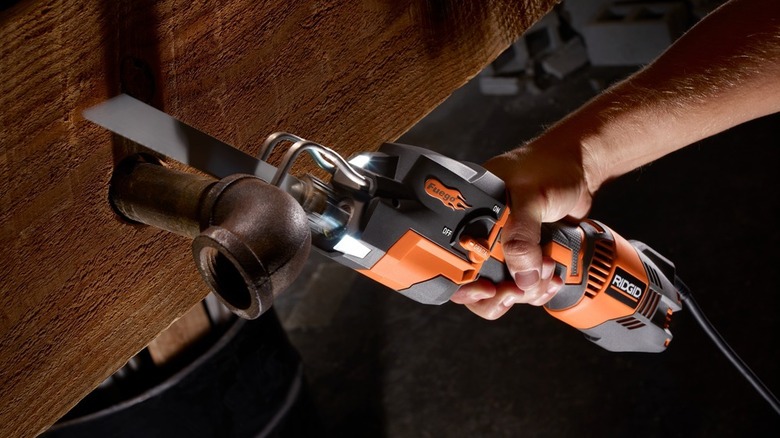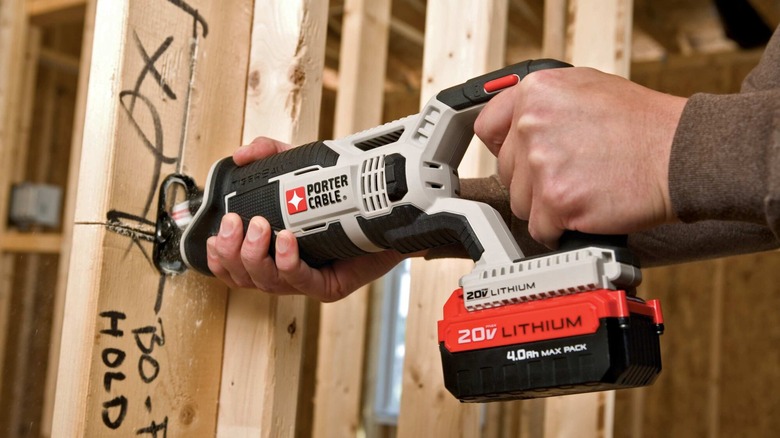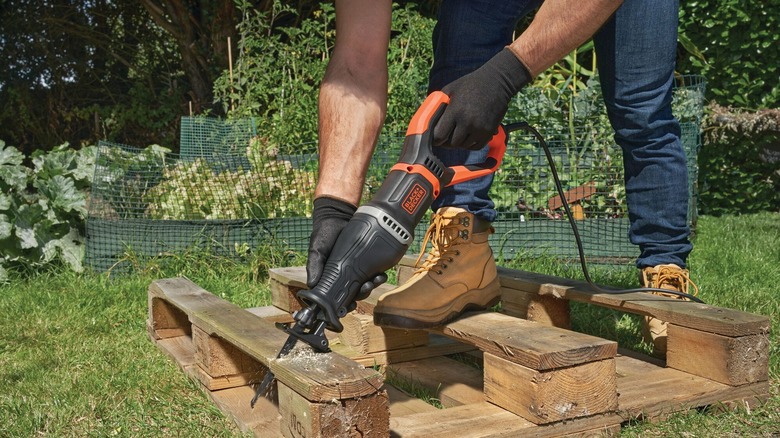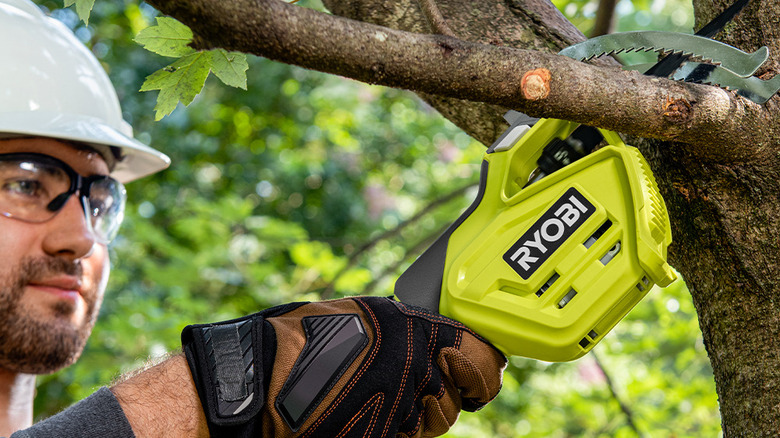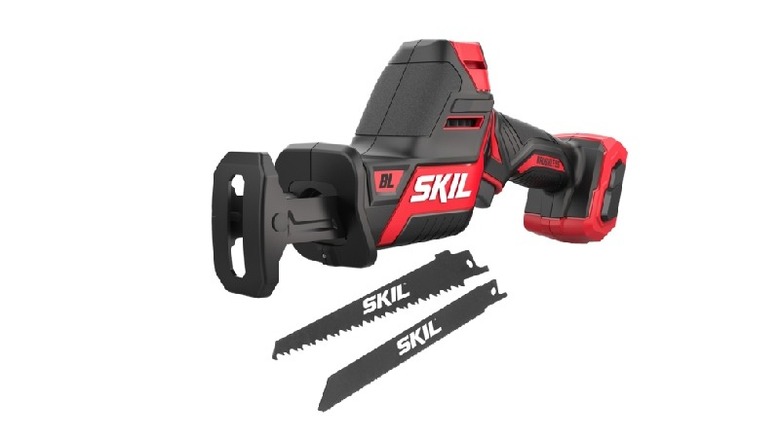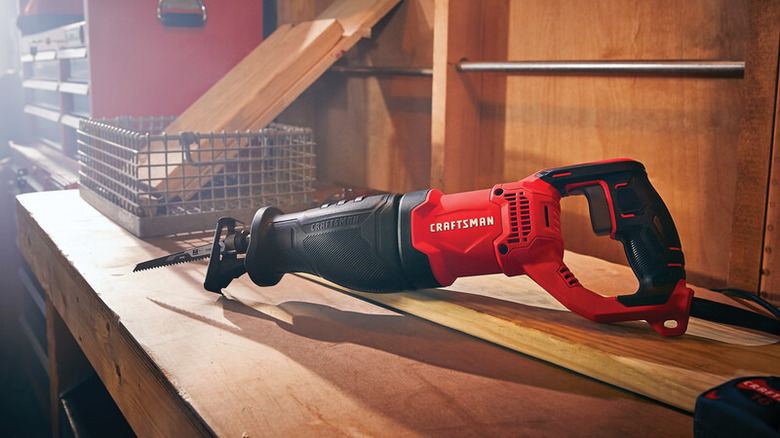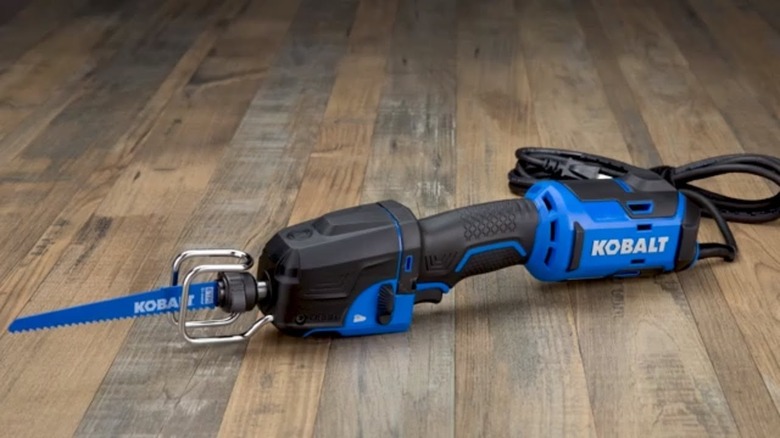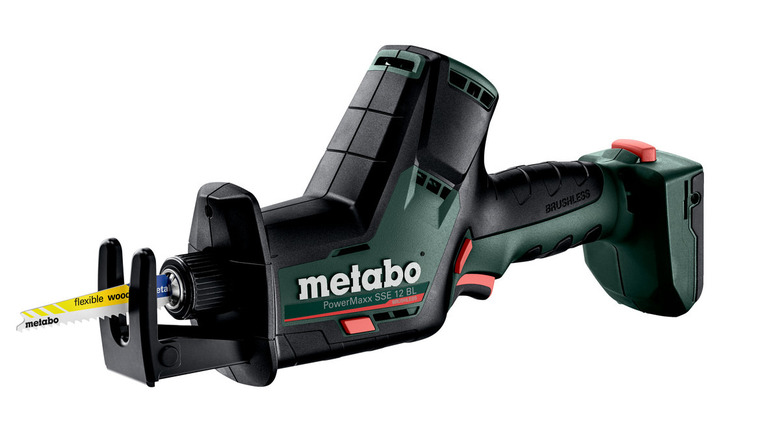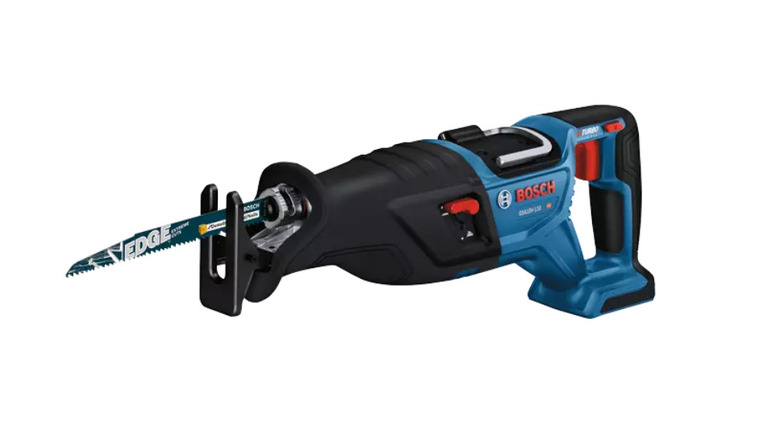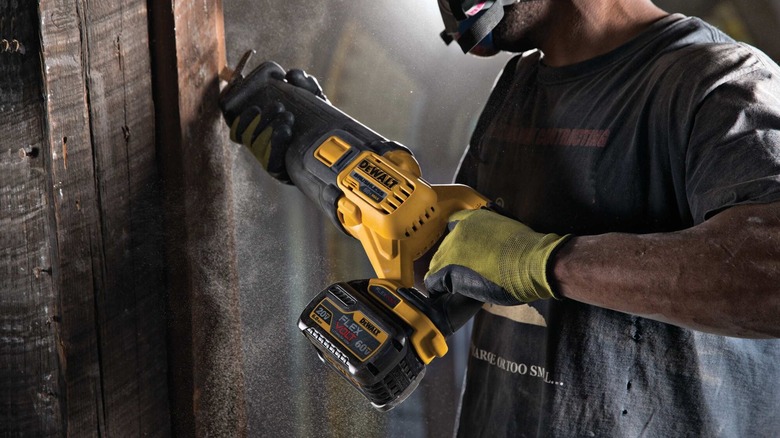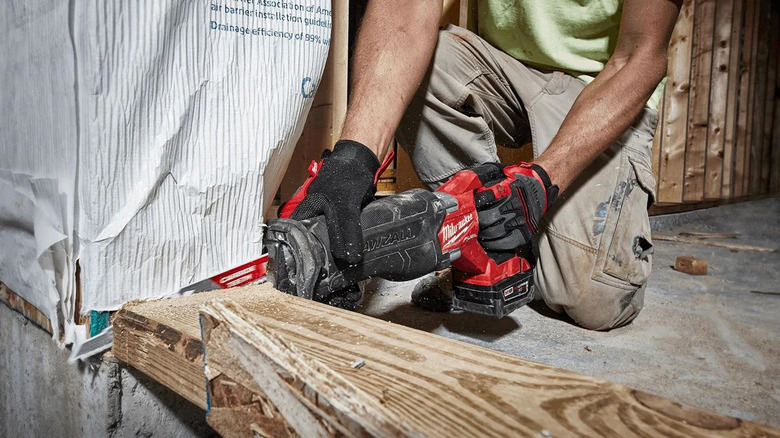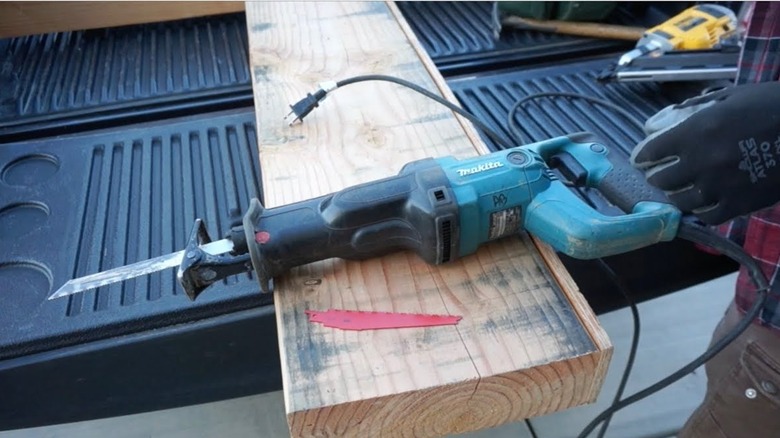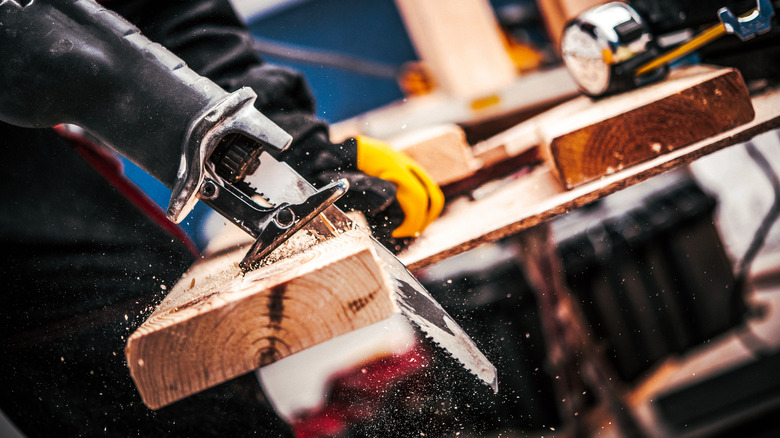Every Major Reciprocating Saw Brand Ranked Worst To Best
A reciprocating saw may not be a staple in every home tool collection, but it certainly comes in handy for various professional and DIY tasks. It features a straight-edged saw that rapidly moves forwards and backward—or "reciprocates." This not only saves you a lot of effort compared to its manual counterpart while making precise cuts in wood, plastic, and even metal, but its compact size also enables work in tight spaces where a manual saw would require plenty of elbow room and lateral space for cutting.
Reciprocating saws are often eminently portable, with many premium models being cordless and featuring brushless technology that facilitates a higher power output while being more efficient on the battery. Most brands also produce one-handed models for lighter duties, such as limbing small branches or cutting through plastic piping or guttering while keeping your cutting object steady with your free hand. Corded versions are also available for those working longer shifts or where battery charging isn't practical.
In short, there is a reciprocating saw to suit most requirements, and here, we examine which brands produce the best quality saws for a range of uses and which perform best in various testing environments. We explain our ranking methodology in greater detail at the foot of the article, which considers brand reputation as compiled by trusted aggregate sites, such as Consumer Reports, and thorough research carried out by independent reviewers, including ToolBoxBuzz. The following are our picks of today's top reciprocating saw manufacturers, counting down to the best brand overall.
Ridgid
Based in Ohio, Ridgid is a tool manufacturer that has been in operation since 1923. Since patenting its first globally successful pipe wrench, the company has gone from strength to strength and now makes a wide range of tools for industrial and home use.
They only offer two compact reciprocating saws, and neither is cordless, but they do include some valuable features. These include a variable speed, two-finger trigger to reduce fatigue, toolless blade changing, and adjustable shoes to guide the blade. There is a single-handed option and a more heavy-duty model that provides orbital and linear action for wood and metal, respectively. However, they are still fairly basic compared to more premium cordless models, although the all-metal die-cast housing is a nice feature, as is the lifetime service agreement that comes with each purchase.
Ridgid has the most limited range in our ranking. That said, their saws' wood-cutting performance is excellent, thanks to their orbital action, and they do represent good value. Those looking for an affordable corded reciprocating saw might consider Ridgid, but there are certainly better options available at a similar price point; hence, it ranks lowest on our list.
Porter-Cable
Porter-Cable is another veteran U.S. tool manufacturer that is over a century old. Now, under the ownership of Stanley Black & Decker (SBD), it has moved its manufacturing abroad, but this likely keeps prices low, and it does produce some very good value tools. All of the tool-only packages are priced well under $100, although, as with most brands in this ranking, batteries are usually sold separately, which considerably increases the final price.
The company offers four diverse models, including a corded 7.5-amp model, a corded 8.5-amp orbital model with more efficient cutting, and 20-volt lightweight and heavy-duty, cordless options. The latter is the only model in the range with brushless technology that offers more power and better battery efficiency, albeit at an extra cost.
As might be expected, Porter-Cable didn't fare as well as many more expensive brands in testing, placing last in the ToolBox Buzz review. It did, however, rank well for its products' lightweight properties and quiet operation. Ultimately, the Porter-Cable range would be a good fit for the casual DIYer for lighter duties, such as the seasonal limbing of branches and firewood prep. Still, there are better options available for more serious cutting duties.
Black and Decker
Black and Decker is a familiar brand that produces good-value tools across a broad range. Established in 1910, the revolutionary company first patented the pistol-style electric drill in 1917 and the cordless electric drill in 1962. The company offers a limited selection of three reciprocating saws plus two reciprocating saw attachments for multitools, although it also includes a corded hand saw for cutting wood.
The three standard reciprocating saw models that Black and Decker offers are diverse from each other, with an ultra-compact hacksaw-style option for finer cutting and pruning, a single-handed 10.8-volt option for more demanding tasks, and a heavy-duty 18-volt two-handed option with a pivoting shoe, large guarded handle, and toolless blade changing functionality.
A veteran brand, Black and Decker provides a good balance between quality and affordability. Unfortunately, compatriot rivals, including DeWalt, Milwaukee, and Craftsman, trump it in terms of reciprocating saw selection and features. For example, they all utilize brushless cordless technology in an industry that Black and Decker was pivotal in creating. As such, the pioneering brand ranks lower here.
Ryobi
Japanese company Ryobi is making great waves in the cordless power tool industry, largely thanks to its practical line of 18V One+ products. These feature an interchangeable battery that can be used across its extensive range of cordless 18-volt tools, which include chainsaws, trimmers, drills, and reciprocating saws, to name a few.
Ryobi's reciprocating saw range includes six products: one corded option and the rest belonging to its cordless 18V One+ series. The remaining five products are diverse in size and functionality, so if you already use 18V One+ tools, there should be a reciprocating saw here to suit your requirements. These include a pruning saw, a one-handed saw, a compact saw, and its brushless counterpart, as well as a heavy-duty brushless saw for tackling more demanding jobs.
Prices range from $79 for an entry-level saw to $129 for the most powerful option, with the more bespoke pruning saw costing around $135. These saws deserve praise for being among the best value cordless options with brushless functionality, and either would make a useful addition to a larger 18V One+ collection. However, in testing, their cutting power doesn't measure up alongside some premium brands, leaving Ryobi as a midfielder in our ranking.
Skil
The name "Skil" has become synonymous with the handheld circular saws it invented. Perhaps unsurprisingly, the brand includes many different types of saws in its product line, including chainsaws, jigsaws, and reciprocating saws. Skil has gone on to become an innovator in cordless tech, with advanced cooling systems and fast-charging batteries that improve efficiency while working.
There is an impressive range of eight reciprocating saw models available from Skil, with four corded and four cordless options and a choice of several power outputs and sizes. There are two one-handed cordless models with 12-volt and 20-volt power outputs and two 20-volt heavy-duty models, one of which features brushless technology. Skil is one of the few companies that places equal importance on corded options, which provide unlimited power when working long shifts in a workshop, factory, or work site.
Skil's range is undoubtedly high quality and affordable, making it one of the better value-for-money brands in this ranking. In testing, Skil's cordless RS582902 model had one of the shortest stroke lengths of one inch, which likely affected performance, as it ranked among the slowest brands when cutting wood, gas pipes, and metal materials.
Craftsman
Veteran brand Craftsman has been manufacturing tools in the USA since the 1920s and has a rich history of innovation in over 100 years of business. In 2017, the company was acquired by tool giant Stanley Black & Decker. However, it still operates to the same high standards and boasts better quality reciprocating saws than its parent company.
There are four reciprocating saws in Craftsman's collection, plus one that can be bought as a kit with a battery included. There is a single 7.5-amp corded model to satisfy the requirement for extra power and a compact, one-handed saw. The remaining two cordless models are very similar in appearance, although one has the more powerful brushless technology. These have right-angled handles with a large guard, blade shoes, and variable-speed triggers for more controlled cuts.
Craftsman reciprocating saws are among the quietest models in testing, which is an important consideration when working in built-up areas. They also boast some of the highest stroke-per-minute rates at a maximum of 3,200 SPM. Despite this, they did not perform especially well in cutting tests, which is reflected in this ranking.
Kobalt
The Kobalt brand is not widely known outside the USA, as it is available primarily via Lowe's hardware stores. However, its limited range of reciprocating tools is of good quality, with all its cordless models using brushless technology and good value, with the flagship saw costing less than $150.
Kobalt has four saws in its range, which have good diversity for various cutting applications. In addition to the standard single-corded option, the three cordless tools include a one-handed lightweight model and two more heavy-duty 24-volt options. These provide similar stroke-per-minute rates of 2,100 and 2,300 SPM, with the main difference being that the more expensive model has an orbital action for more efficient cutting.
A limited availability via Lowe's affects Kobalt's ranking here. However, its products perform well in testing, with ToolBoxBuzz placing them fifth and joint seventh in its testing results, excelling in ergonomics and gas pipe and metal cutting. For this reason, Kobalt places highest among the budget options in this ranking.
Metabo
Established in Germany in the 1920s, Metabo has a history of innovation as the inventor of the hand-held, manually-operated rotary drill. Nowadays, it has its sights set on much more specialized endeavors as one of the foremost authorities in battery tech, with an extensive range of cordless products based on its LiHD technology.
Metabo's range of five cordless reciprocating saws includes heavy-duty and compact options, focusing on robust build quality and ergonomic attributes. For example, the gear housing is made of lightweight aluminum, which is plastic-coated for improved longevity, depth guides can be adjusted for different cutting applications, and quick-release blades can be rotated 180 degrees for overhead work. Most can be used with one or two-handed operation, and handy features such as LED lighting assist you in low-lighting working environments.
While it may not be the first brand that springs to mind when you think of power tool manufacturers, Metabo benefits from typically excellent German engineering, and the proof is in the cutting. The brand ranked third and tenth in the two products tested, with good marks for their ergonomics, noise reduction, and lightweight properties. If you are looking for a serious reciprocating saw for all-day use, this is certainly a brand worth considering.
Bosch
Since the late 19th century, Bosch has been a significant name in the power tool industry. It's little wonder then that this trailblazing company has since become a household name. In 2003, it consolidated its tool and accessory businesses in North America to become the Robert Bosch Tool Corporation, with significant market share in that territory and overseas.
Bosch has a wide selection of 11 reciprocating saws and associated accessories, including kits, heavy-duty, and compact, one-handed options. These are available corded or with 12- or 18-volt power supplies and are suitable for the casual DIYer, professional tradesperson, and anyone in between. The range is extensive, from single-handed pocket-sized saws to highly robust, two-handed, heavy-duty units built to withstand regular worksite use.
While Bosch didn't feature in the ToolBoxBuzz testing review, its reputation as a premium manufacturer of high-quality tools speaks for itself, and the diversity of its range suggests much research and development has gone into the creation of several feature-rich reciprocating saws. Bosch's tools are also good value for money, as we discussed in an earlier SlashGear review, and it is a strong contender in this ranking.
DeWalt
No introduction is necessary for DeWalt, as the company is one of the foremost power tool manufacturers on the planet. Characterized by its bright yellow products, this homegrown American company also recently celebrated its centenary and, like Craftsman and Porter-Cable, is a subsidiary of Stanley Black and Decker.
DeWalt has the most extensive range of 25 reciprocating saw products, including kits and options for heavy-duty and light cutting. Many fall under the umbrella of its 20V MAX range of brushless, cordless tools and its "Extreme" and "Atomic" product lines, which provide more power than many of their 20-volt rivals. Another innovation from DeWalt is its "Flexvolt" technology, designed to provide as much constant power as a corded model in a cordless unit. In general, DeWalt products are rugged, powerful, and durable.
In testing, the flagship DeWalt DCS386B model was a midfielder in the final results. However, the brand's impressive innovation, broad product range, and build quality boosts DeWalt's position in our ranking, as it provides its customers with more choice, and its reciprocating saws are likely to go the distance over several years of use.
Milwaukee
Milwaukee's distinctive red tool catalog has become a common fixture on work sites worldwide, and with good reason. Its tools represent good value, and having just celebrated its centenary year, it has plenty of experience in the industry for making rugged and reliable products.
As with most brands in this ranking, Milwaukee's wide range of corded and cordless models covers compact, one-handed, and heavy-duty options. The brand registered the name "Sawzall" to describe its range, which offers 14 items to choose from, including kits with batteries included. There is also the "Hackzall" range of reciprocating saws, which have shorter stroke lengths and are well suited to cutting less dense materials like drywall, plastic pipe, and wood.
While Milwaukee occupies the slightly more expensive end of the reciprocating saw market, you do get superior build quality and performance for the extra cost. Its saws also have excellent ergonomics and provide a comparatively wide range of features, and it is well deserved for its place near the top of this ranking.
Makita
There's much to be said for Japanese technology, as the nation that produces some of the most reliable, well-built electrical products, which are also often of excellent value for money. Makita certainly represents all these qualities, as anyone who has ever used one of its tools on a work site will attest. As someone who used to work in an industrial furniture workshop that used Makita power tools exclusively, I never witnessed a failure, while our heavy machinery and production equipment would break down all around us on a regular basis.
Makita offers eleven cordless products, most of which are part of its 18-volt LXT series of power tools. These reciprocating saws are also available as kits or in ultra-compact versions, and some heavy-duty 36-volt models use two 18-volt lithium batteries for more demanding tasks. There is a Makita reciprocating saw for every requirement, and all promise the same high standards of build quality and value, with much of the range priced under $100.
Certain tools might be better suited to specific tasks, and for that, each of the brands listed here would require more in-depth research according to those requirements. Yet, as far as a general aggregation of each brand's qualities and failings is concerned, Makita scores highly for its product range, rugged longevity, value, and cutting performance and deserves its place at the top of this ranking.
How we ranked our reciprocating saw brands
We compiled usable data and product reviews from trusted sources to determine how the best reciprocating saw brands placed in this ranking. These included brand appraisals from aggregate sites and reviewers, including Consumer Reports, Popular Mechanics, and ProToolReviews, as well as extensive testing carried out by ToolBoxBuzz. We also considered additional general metrics, including product availability, product range, and brand reputation, when finalizing our ranking.

